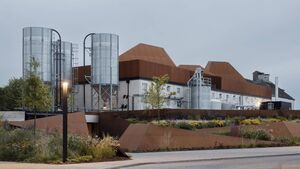Planning sought to complete Bono's distillery near Laois/Kildare border

Church of Oak Distillery by ODOS Architects
The Bono-backed distillery and visitors’ centre which was originally given the green light for the old Ballykelly Mills at Minch Norton in Monasterevin in August 2019, has re-applied for planning permission in order to finish this €50m project.
Local councillor – and architect by profession – Cllr Kevin Duffy reckons that’s what this the re-application is for.
“Oh, they’ve substantially commenced the work there, probably 60 per cent of it is done,” he estimated.
“It’s tens of millions in there already, there’s a working distillery on site already,” he said.
“The re-application is probably just to get it finished, get the visitor’s centre open, get it landscaped,” he said.
“Remember, with Covid there would have been a lot of stoppages and delays, so I hope the council would look at that positively,” he opined.
“Five years (the lifespan of a planning permit) is a short enough period, especially when building such a significant project,” he said.
Five years ago cllr Duffy believed the Church of Oak Distillery (as it is to be known) would be: “The biggest thing to happen in Monasterevin in centuries!” (To be fair, he now concedes the new St Paul’s Secondary School probably pips Church of Oak for that title.) “It’s a huge positive project for the town, employing people from the town, and expert distillers from outside the town,” he said.
“This extension is crucial to get so the overall vision for the site can be completed. It’s quite an impressive building, actually,” he said.
The plan – which has been in the works for nearly a year before getting that planning permission in 2019 – is fronted by a company called Jewelfield Ltd, which is owned by by Northern Irish businessman Paddy McKillen (69), with Paul Hewson, aka Bono, listed as a major shareholder.
McKillen’s impressive portfolio includes Claridges and The Connaught in London, and will totally rejuvenate the 217-year-old canal-side protected structure.
The U2 frontman is hoping to exploit a double-digit growth sector so recently beloved of such celebrity investors as Henry Mouncharles, George Clooney and Conor McGregor.
The mill was previously owned and operated by the Cassidy family, who made whiskey there from 1784 until 1921.
The 5,100 sqm development on a 2.1Ha site includes provision for the distillery, tasting rooms, visitor centre, café and exhibition spaces.
When available to speak on the project five years ago, Mr McKillen said: “We’re restoring a beautiful 200-year-old mill and reviving Monasterevin’s rich heritage in producing the finest whiskey going right back to the 18th century”.
“We’re investing €50m into this initial phase, which is the start of a long-term strategy. It fits very well with our existing hospitality businesses and the great global interest in Irish whiskey over the past number of years,” he added.
Mr McKillen senior is said by his spokesperson to be “very excited” about the planned whiskey distillery, which follows on from his development of the Château la Coste winery in Provence, now the biggest biodynamic vineyard in France.
The proposed Monasterevin distillery is one of 15 in the planning stages, under construction, or recently launched in Ireland, according to the Irish Whiskey Association.
As well as contributing to the domestic tourism sector through visitor centres and exhibitions, the boom in artisan distilleries is also boosting export sales.
A record 14 million cases of Irish whiskey were sold around the world in 2021, an increase of 21 per cent compared to 2020 (most recent figures available). Russia and Ukraine cumulatively accounted for seven per cent of all Irish whiskey sales in 2021, leaving a likely negative impact on global sales in 2022 on account of the continuing conflict.
India, Nigeria and China have been identified as emerging markets to watch for future export growth.




